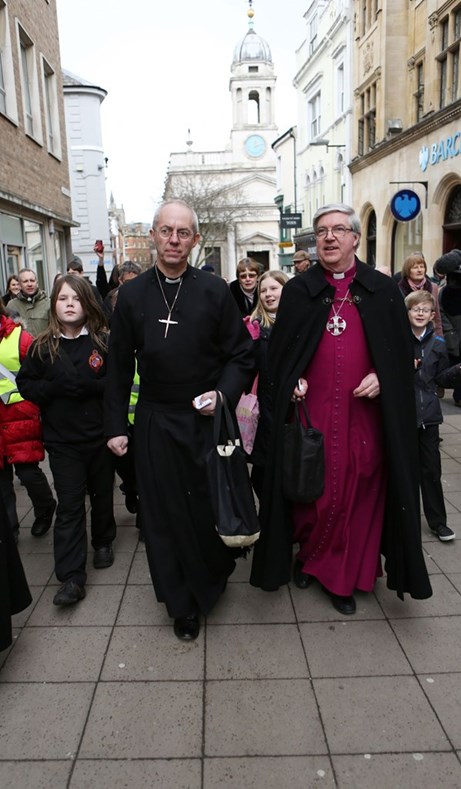A “Bishops’ reflection group on sexuality” will be assisting in the episcopal discernment process as the Church of England debates same-sex relations.
A group of ten bishops will create material to be used by the House of Bishops in November. The task force is charged with coming up with questions on sexuality and to attempt to formulate possible answers, in addition to “consider any matter which the Archbishops request that the group should have on its agenda”.
The members of the reflection group are:
The Bishop of Norwich, the Rt Revd Graham James (Chair)
The Bishop of Willesden, the Rt Revd Pete Broadbent (Vice-Chair)
The Bishop of Oxford, Dr Steven Croft
The Bishop of Ebbsfleet, the Rt Revd Jonathan Goodall
The Bishop of Blackburn, the Rt Revd Julian Henderson
The Bishop of Stockport, the Rt Revd Libby Lane
The Bishop of Crediton, the Rt Revd Sarah Mullally
The Bishop of St Edmundsbury & Ipswich, the Rt Revd Martin Seeley
The Bishop of Maidstone, the Rt Revd Rod Thomas
The Bishop of Dorking the Rt Revd Jo Wells
Church officials supporting the reflection group include William Nye, the secretary general of the Archbishops’ Council and General Synod; Canon David Porter, the Archbishop of Canterbury’s chief of staff; and the Revd Dr Malcolm Brown, the director of mission and public affairs at Church House.
The full statement reads:
“As is the usual pattern of meetings of the College every third year the College of Bishops are joined for part of their meeting by bishops from the Scottish Episcopal Church, Church of Ireland and Church in Wales. Representatives from each of the sister churches made presentations to the college and engaged fully in discussions during the first days of the meeting.
A wide-ranging agenda included presentations and discussions on safeguarding, the Renewal and Reform programme, the post-Brexit political landscape, clergywomen in leadership, clergy well-being and issues of sexuality.
“Discussions on issues of sexuality took place as part of a new process of episcopal discernment which will continue during the meetings of the House of Bishops in November and December of this year and in January next year at the next meeting of the College of Bishops. These discussions were undertaken by the College of Bishops alone.
Whilst the process of episcopal discernment is in the public domain the Bishops agreed that the contents of their discussion should not be shared in public during the process so as to enable those discussions to be conducted freely and in a spirit of full collegiality. Consequently the contents of the conversations will remain private and participants have agreed not to comment on the contents of the discussions beyond their own views.
Following the conclusion of the Shared Conversations process the Archbishops of Canterbury and York have invited some bishops to take forward work on sexuality to assist the episcopal discernment process. The Bishops’ Reflection Group on Sexuality will be chaired by Graham James, the Bishop of Norwich. The full membership of the group and its terms of reference will be published in due course.”
The terms of reference:
- To assist the Bishops of the Church of England in their reflection on issues relating to human sexuality, in the light of theological, biblical, ecumenical, Anglican Communion, pastoral, missiological, historical and societal considerations bearing on these issues, and following experiences of the shared conversations held around the Church between 2014 and 2016.
- To assist the House of Bishops in identifying questions in relation to human sexuality, with particular reference to same sex relationships. It will also develop possible answers to those questions for the House to consider, as a contribution to the leadership which the House provides to the Church on such issues.
- To provide material to assist the House of Bishops in its reflections in November 2016, and subsequently as requested, and to assist the House in its development of any statements on these matters which it may provide to the wider Church.
- To consider any matter which the Archbishops request that the group should have on its agenda.
Information from Church Times
Photo credit: Press Association

